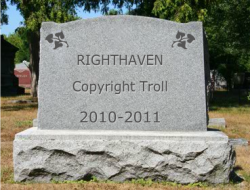Welcome to this Halloween-eve edition of the Weekly News Roundup, where you’ll read scary stories that will send chills down your spine, give you nightmares night after night, and bring forth the disturbing thoughts from the deepest and darkest part of your soul. Stories like, um, a new proposed copyright bill, and I guess something about a new jailbreak device for the PS3. Okay, not quite as scary as I first thought, perhaps.

Starting with the copyright news as has been the custom, Halloween eve or otherwise, and we have a scary thing to report, and that’s the US House of Representative’s newly produced copyright bill, dubbed the Stop Online Piracy Act (SOPA).
First off, the title of the bill is misleading, because online piracy cannot be stopped, as history has shown us, through legislation or technical measures – people will just find a way around it as usual. But the “people’s representatives”, you know, the guy with only 9% approval these days, are trying their best to ensure the good money lobbyist have spent produce something worthy of the $$$, and so we have SOPA. SOPA is similar to the stalled PROTECT IP Act, which was stalled after one Senator with common sense (there had to be one, after all) decided that sacrificing the tenets of democracy to appease the movie industry wasn’t the right thing to do. SOPA will give the government the power to seize the assets of one industry at the behest of the most powerful members of another competing industry, namely the members represented by the RIAA and MPAA, all because of the stronger lobbying power of that industry. That’s democracy at work, folks.
And the bill extends not only to websites and domain names in the US (I think this bill will kill US jobs as webmasters and businesses mitigate the risk of domain seizures by moving their business elsewhere), it also applies to foreign websites (they might as well just write “The Pirate Bay” into the bill, if they haven’t already). And in the spirit of shifting responsibility of copyright enforcement away from the actual copyright holders towards the government, as the bill will allow the US government to lead the charge overseas and file injunctions against “bad” websites on behalf of studios like Sony and Fox. Because as you know, these small businesses don’t really have the financial resources, nor teams of lawyers, that can handle this sort of stuff, so tax payers will have to do the right thing and help out of course.
But while SOPA will make the US government the public face of copyright enforcement, the government is already doing plenty behind the scenes, specifically, in Russia. Russia’s application to join the WTO faces many hurdles, but if they are seen as friendly copyright enforcement, it will make the MPAA/RIAA happy, and then they will stop whispering bad things about Russia (which has already helped to put the country onto the “notorious piracy market” list) to the US government, which will then drop (some) opposition to Russia’s application. And so the Russia government is now making an example of two admins of the defunct BitTorrent tracker, Interfilm. The married couple now faces up to 6 years in a Russian prison, as the MPAA claims the trackers has caused as much as $1.25 billion in damages (although under Russian law, the couple may only be liable for $16,000). International diplomacy and politics in action, comrades.

This gravestone picture detailing Righthaven's possible demise is appropriate given it's Halloween-eve and all, despite having being used only last month. Plus Righthaven sort of sounds like Raven, which is very Halloween-y
But it’s not all bad news this week. With the threat of bankruptcy looming, Righthaven has somehow gotten themselves into more trouble this week, as a judge has ruled against the firm in the biggest ruling yet – $120,000 in costs that Righthaven will have to pay to Thomas DiBiase, a former prosecutor that Righthaven tried to sue for the use of an article by the Las Vegas Review-Journal. Remember that Righthaven has already said they are having trouble paying just the $35,000 ruled against them, to the point where they may have to declare bankruptcy, so $120,000 is going to be a bit more difficult. At this point, and I know I shouldn’t, I almost feel sorry for Righthaven. While what they’re trying to do is despicable, in my opinion, the way they have done is, really, just stupid. And I have a soft spot for stupid people, or law firms. The key to settlement-for-profit is to find the right marks, I mean, defendants. You pick the ones that are less likely to put up a fight, and more likely to pay up. So it’s a no go suing poor people, people with knowledge of the law (like, for example, a former prosecutor), people who have the connections to mount a good defence (for example, a former prosecutor), and people or groups that are not part of a charity, non profit, or public service organisation (for example, a former prosecutor who runs a non profit websites providing details about unsolved murder cases as a public service). Other law firms have been selecting defendants carefully and wisely, so it’s no secret. But the biggest problem with Righthaven’s approach is that, copying newspaper articles is not in the same league as copying music or movies. The people who download music and movies illegally, and their motives for doing so, are very much different to people who copy/paste newspaper articles for discussion, public discourse, or information sharing, usually without any financial benefit to themselves.
Over here in Australia, opposition to our local variety of “copyright trolling” seems to be growing, as the boss of an ISP has signalled the company’s intention to fight the “scum” (he’s words, not mine) who are trying to profit from allegations of copyright infringement. John Linton, chief of ISP Exetel says the ISP is now taking measures and investing $200,000 in the process to do some unspecified work to make it harder for the “blackmailing scum” to target their customers. It will be interesting to see if other ISPs follow suit.
And to add to the growing movement against draconian anti-piracy measure, whether it’s legal or technical, Valve’s Gabe Newell is once again highlighting that the only way to prevent online piracy may very well mean that publishers have to compete with pirates, by doing the controversial thing of actually improving services. Once again, Newell highlighted the success Valve’s Steam platform has had in the pirate haven known as Russia, a country that publishers have said would be impossible to make money from due to rampant piracy, but is now Steam’s second largest continental European market. Apart from more reasonable pricing, the key was localisation, according to Newell, to provide Russian translated games to gamers before the pirates do, as opposed to the publisher’s tradition of waiting 6 months or more to bring out a local version. Publishers want to eliminate piracy, but they don’t really want to do the hard work of making a better (or in Russia’s case, a usuable) product. It seems you can’t have your cake and still eat it (even if the cake is a lie).
And even in the area of pricing, it seems publisher may be able to compete with pirates too. Competing with “free” isn’t impossible it seems, as Newell says their pricing experiment with the now “free-to-play” Team Fortress 2 has paid off big time, with 20% to 30% of those playing it (for free) paying for in-game stuff. Mostly hats, I guess. Just goes to show that people are willing to pay for anything if they decide, and not publishers, if there’s value in it. A variation on “free-to-play” may very well be “pay-what-you-want”, and I would love to see Steam try this one out.

In HD/3D news, there’s not much going on, although Blu-ray market share remains suitably high and above the 30% level that, a few weeks ago, would have set new records.
However, I do have a story about Zediva’s ongoing battle with the MPAA. Zediva offered a service where people rent physical DVDs, but the company streams the DVD to users via the web, as opposed to sending them the disc. This week, a judge ruled that what Zediva is doing is not legal and has granted the MPAA a permanent injunction, as it’s just a (not so clever) way to avoid having to pay web streaming licensing fees to movie studios, as no licensing is needed for physical disc rental. This story is only HD related because of the company’s plans (former plans now, perhaps) to stream Blu-ray movies in the future too. Zediva also has to pay the MPAA $1.8 million in damages.

Hulu is not available in Australia and many other countries due to the lack of a global licensing scheme, which sucks for us Australians
Licensing is an interesting issue that I wanted to talk about for a while, but not about what Zediva was trying to do, which was a bit too obvious an attempt to avoid paying the fees, and offered users no real benefits compared to traditional web streaming at all (with all of the benefits belong to Zediva). But licensing right now, I feel, is holding back innovation. The lack of a truly “global” licensing scheme means that companies like Netflix can’t truly call themselves global giants, and the likes of Amazon can’t offer overseas customers the same experience with their Kindles, even though they allow overseas buyers to buy the devices. The greed of copyright holders, wanting to eke out as much as possible from each market individually, is even hurting some of their own initiatives, such as the recently rolled out UltraViolet cloud based digital copy scheme, which is yet again a geo-limited (AKA US and, maybe if you’re lucky, Canada, only) service. And here in Australia, we don’t have Netflix, barely a Kindle presence, no Hulu or Spotify, and UltraViolet won’t really help us (yet), and with most of these services actually making money for studios in the US, it’s a huge opportunity they’re missing out on, just so they can get a couple of thousands more from putting pressure on local distributors (which then forces prices up for local content, and pushes people towards grey imports, or even piracy).
![]() And finally in gaming, it appears another jailbreak device has been released for the PS3 which circumvents Sony’s latest attempts to lock down the console.
And finally in gaming, it appears another jailbreak device has been released for the PS3 which circumvents Sony’s latest attempts to lock down the console.
PS3 gamers with consoles still using firmware 3.55 or older can grab the $50 Jailbreak 2 device, and play games released after firmware 3.60, which feature security fixes that prevented the use of the original jailbreak device. And so the cat and mouse game between Sony and hackers continues (although maybe Sony are the mice in this analogy).
That’s it for this week. I’m really tired after a bad night’s sleep, so most likely, I will have no recollection of ever writing any of the above by tomorrow.


